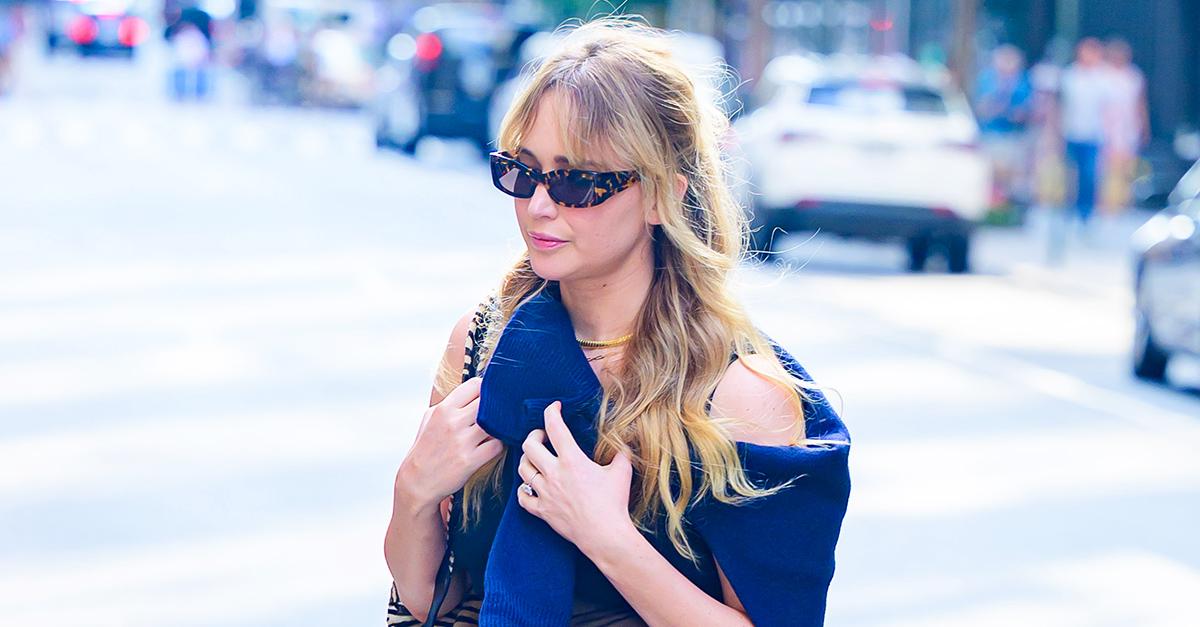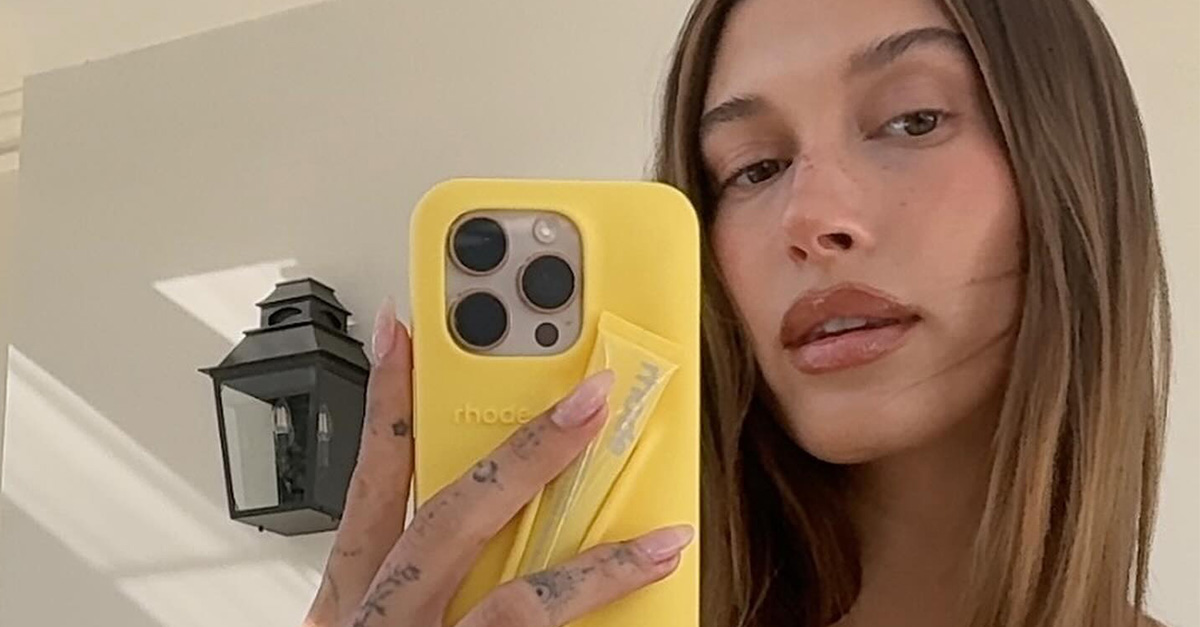Why the light music industry is facing a decline in Chennai - The Hindu
A light music show usually draws a full house since the musicians fill the air with familiar notes and beats, and the audience warms up to much-loved tunes.
Are bands put together by established musicians, or by those who just have an ear for music? How have bands fared over the years? Sankar, whose band is called Saadhaga Paravaigal, is the son of lyricist Ulundurpet Shanmugam. When he was a student in the Government Music College, Chennai, he formed a band with his friends. The college initially did not encourage him. Teachers wanted him to focus on classical music. But when the band began to win prizes in intercollegiate contests, teachers lent their support. His band was christened in January 1988, and the formal launch was in Vani Mahal. “In the 1980s, there used to be light music shows in cinema theatres in the mornings, and the hall would be packed,” recalls Sankar.
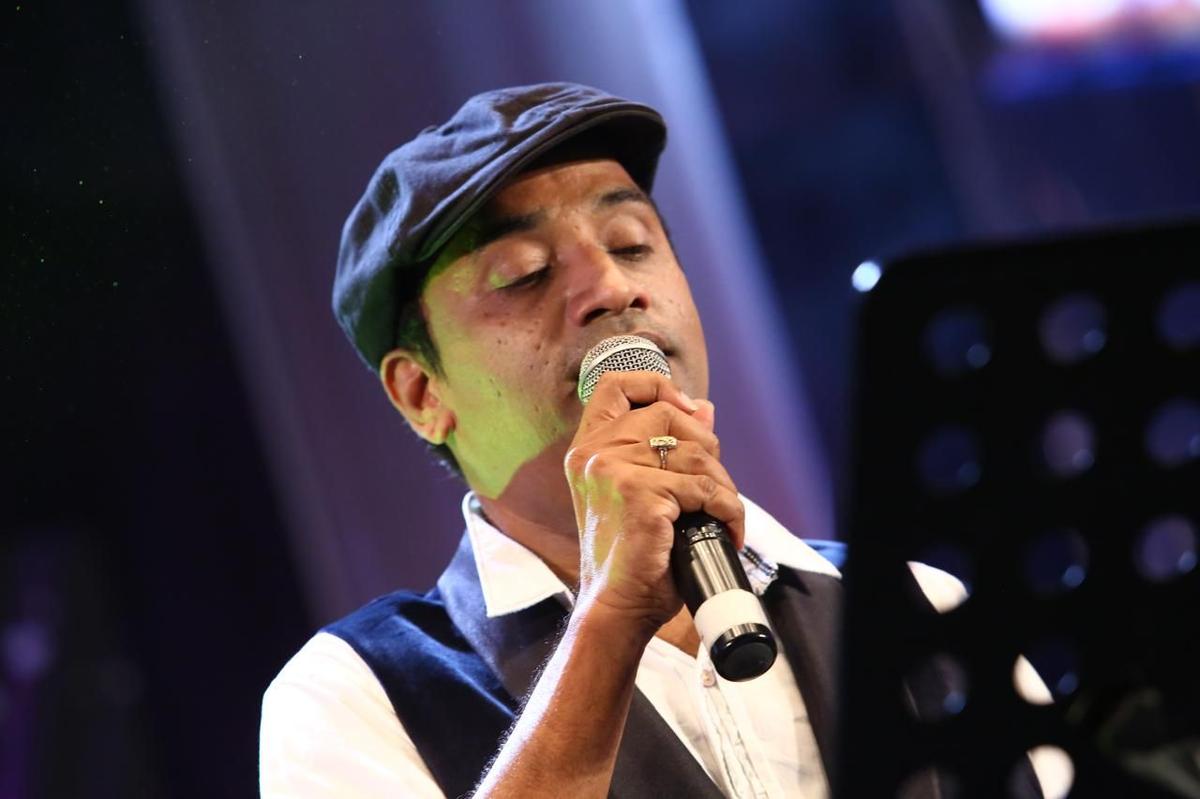
Sankar of Saadhaga Paravaigal band launched his in January 1988. | Photo Credit: Special Arrangement
Lakshman formed a band with some of his friends while studying in Presidency college. “We used to rent instruments from Johnny D’ Mello in Mount Road. The cost of a guitar was Rs. 2,000, but we were paid only Rs. 1,500 for a concert. So he would insist on a bonafide certificate signed by the college principal. D’Mello also had a small space for rehearsals, and the rent was Rs. 125 rupees a day.” Later Lakshman’s band was named Lakshman Sruti. “For our 200th show in 1989, in just two days my brother Raman ensured that the entire band had uniforms.” Surprisingly, until the 5000th show, Lakshman had not studied music at all. He learnt the piano only after that. “We used to have programmes throughout the month, but not anymore. To supplement the income, I plan to start a shop selling, renting and repairing music instruments.”
U.K. Murali, whose band Udhaya Ragam U.K. Murali Innisai Mazhai is 40 years old, did not have a music background when he entered the industry. He learnt the nuances of light music and launched his band. “Sabha concerts are not always profitable, but they give us publicity, which brings us wedding concerts and shows abroad, where the payment is good,” says Murali.
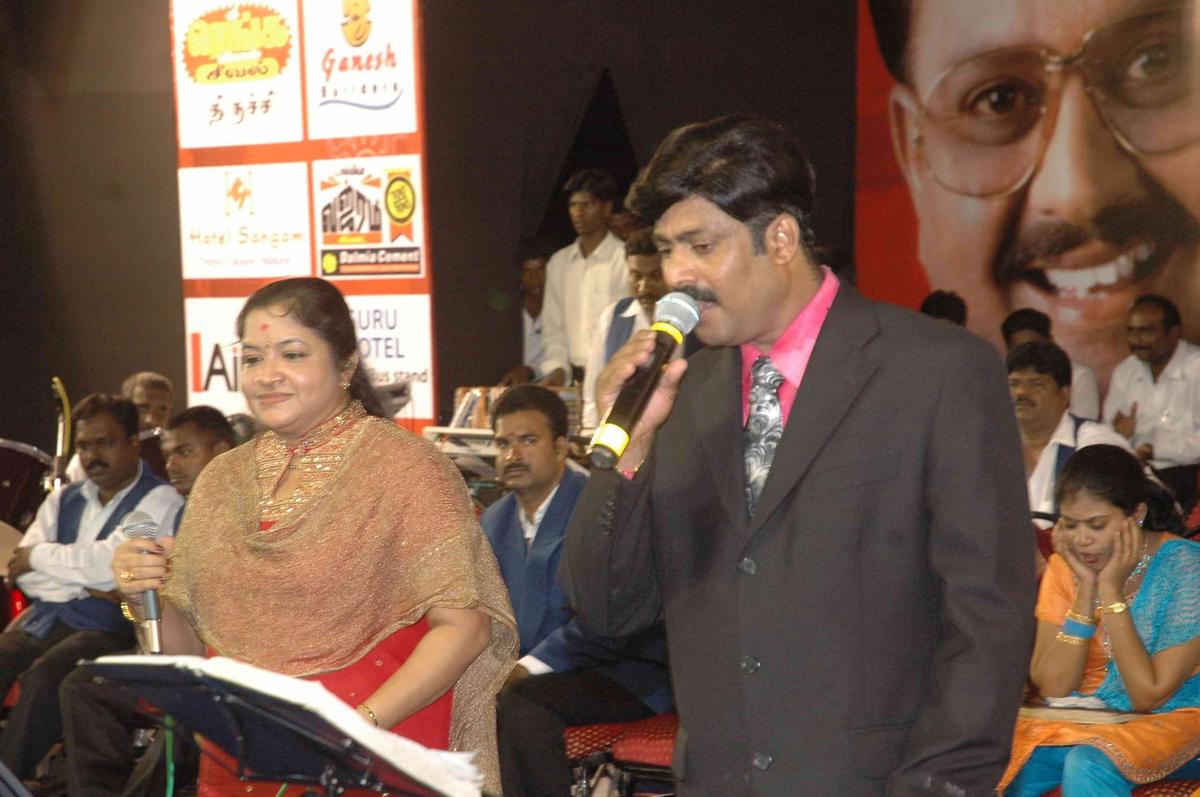
U.K. Murali with K.S. Chitra at one of his shows | Photo Credit: Courtesy: The Band
Some of the musicians, who are part of these bands share how they entered the field and have coped with challenges posed by technology.
Flautist Raghu, who has been in the light music field since 1972, says, “I am 75 now, and still continue to play. Some instruments have taken a hit because of technology. Violin, for example, has disappeared from the stage, because its sound is reproduced on the keyboard. The flute, fortunately, has escaped.”
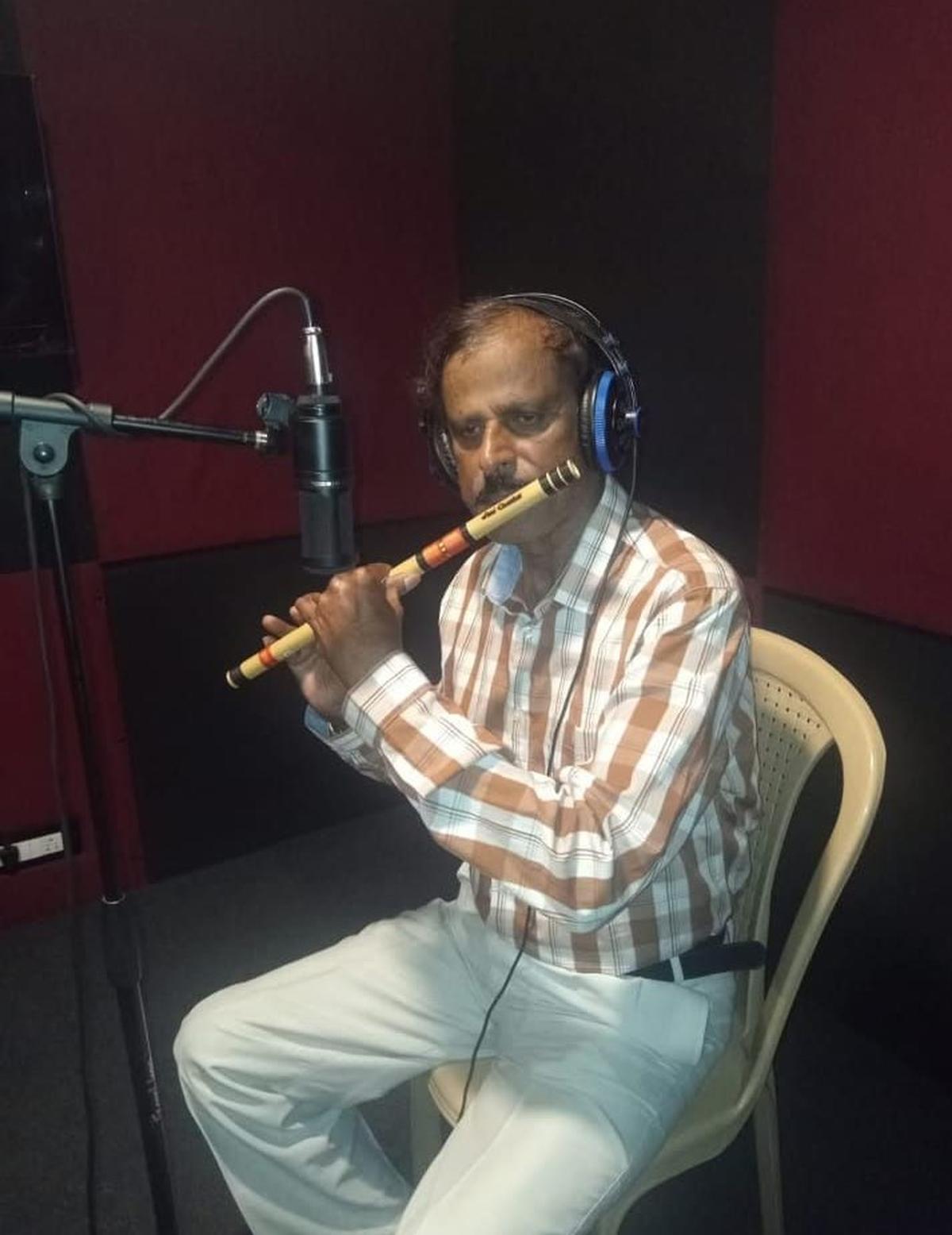
75-year-old flautist Raghu has been in the light music field since 1972. | Photo Credit: Special Arrangement
Satish has been a keyboard player for 35 years, and has performed in M.S. Viswanathan’s shows for 12 years. He has progressed to having his own recording studio. “Learning the keyboard helps you try your hand at composing,” says Satish. “S.P. Balasubrahmanyam and MSV have sung in my devotional albums.”
Nagaraj taught himself to play many percussion instruments and can recite konnakkol as well. “I started as a mimicry artiste. Till the 1980s, in the middle of a music show, there would be 15 minutes of mimicry, but that is no longer the case.”
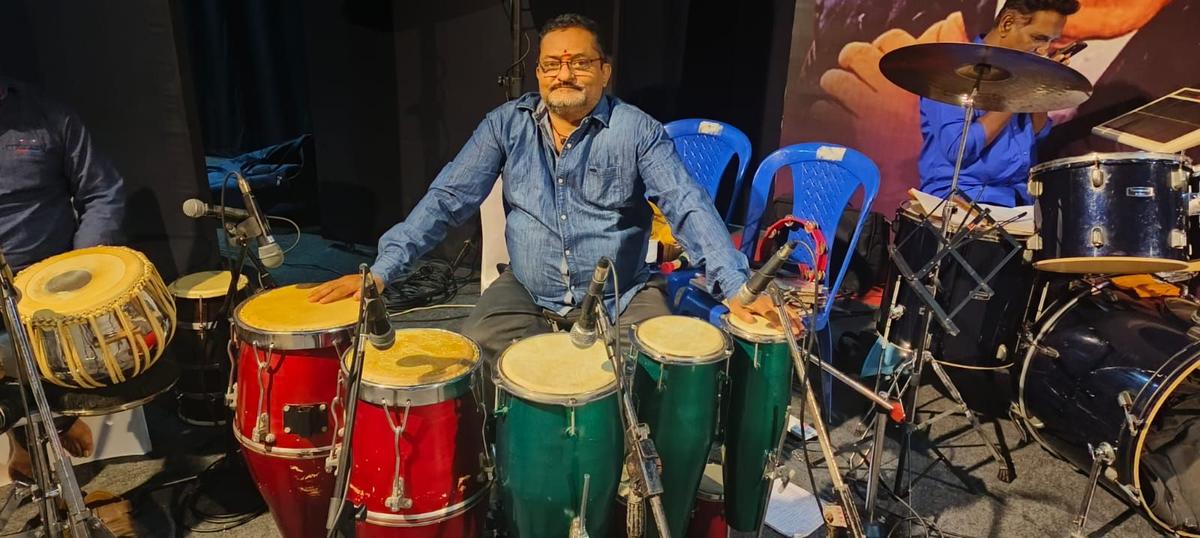
Percussionist Nagaraj. | Photo Credit: Special Arrangement
While in school, tabla player Kiran played for K. Balachander’s TV Serial Jannal, in which SPB played a role. “I know how to play electronic pads, but prefer actual instruments. For some songs such as ‘Thendral vandhu yennai thodum’, it is impossible to produce the perfect tabla sounds on a pad.”
Trumpeter’s Viji’s grandfather, father and uncle used to play the trumpet in the police band. “They took voluntary retirement to be full time musicians,“ says Viji. “The trumpet can be used to express many emotions, including pathos as in the song ‘Veedu varai uravu’. Now brass section instruments are played on the keyboard. What will happen to artistes like me?”
Selva, who plays acoustic drums, did a three-year diploma course in mridangam in the Government Music College, Chennai. When he entered the scene in 1994, electronic rhythm machines were rarely used. But by 1996, they began to be widely used and he decided to embrace technology. He learnt how to play rhythm machines and later electronic pads too.
Bass guitarist Santosh says, “Ilaiyaraaja is the one who has used the bass guitar to the maximum. You cannot sing some songs, such as ‘Mandram vanda thendralukku’ without a bass guitar. In the past, instead of the bass guitar, they used a six foot long instrument called double bass, which is a pure acoustics instrument. Bass guitar is an electronic instrument.”
Singer Anusha Kartik learnt both Carnatic and Hindustani music. She says, “Being in the light music industry is a blessing, because you get to share the stage with renowned playback singers. I have sung with SPB and Yesudas. When I first came to Chennai from Kolkata, I knew only Hindi songs, and had to learn to read Tamil. Today I know more than 300 Tamil songs.”
Kavitha became a stage singer and then studied music in the Government Music College. “During rehearsals, I notate even those songs allotted to someone else, and practise them. The happiest moment in my life was when P. Susheela complimented me for my rendering of the song ‘Alaya maniyin’ (film Paalum Pazhamum).”
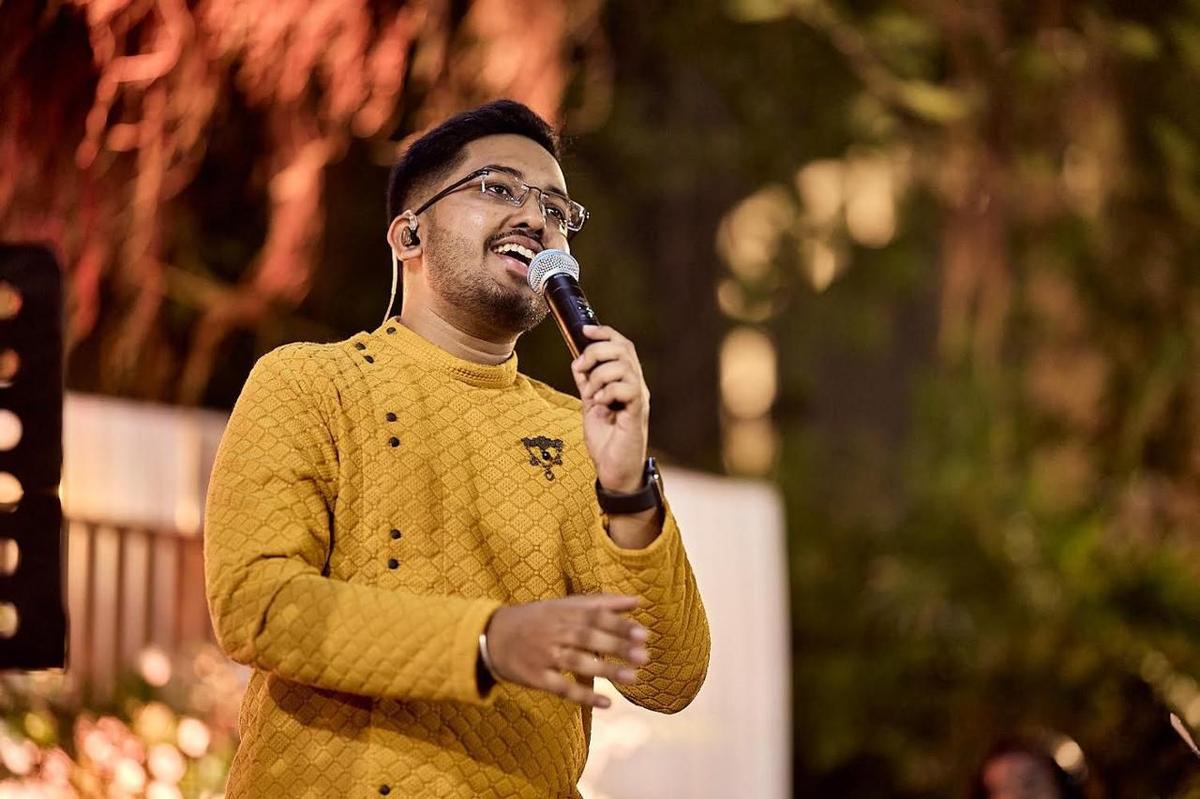
Vocalist Sai Vignesh says singers must resist the tendency to improvise whiel singing film songs. | Photo Credit: Special Arrangement
Vocalist Sai Vignesh learnt Carnatic music from T.R. Vasudevan, a disciple of Chembai Vaidyanatha Bhagavatar. “After I participated in Super Singer, I began performing with various light music bands, and then came the opportunity to sing the super hit song ‘Varaha roopam’, for the Kannada film Kantara. Classical singers must resist the tendency to improvise when they sing film songs. They must not add unnecessary gamakas.”
““We used to have programmes throughout the month, but not anymore. To supplement the income, I plan to start a shop selling, renting and repairing music instruments.””LakshmanLakshman Sruthi orchestra
What is the reason for fewer programmes these days? Satish points out that some musicians like to adopt a freestyle of music, where they don’t follow every note of the background score, but produce something similar. “Freestyle is unacceptable. How can anyone tamper with what music directors have composed?” asks Selva. “These days, many people go in for DJ’s. This too has impacted us,” says Murali.
“Costs, including rent for halls, have gone up. In addition, we also have to pay licensing fees to IPRS (Indian Performing Right Society). By way of abundant caution, some hotels insist that licenses must also be obtained from Novex Communications and PPL (Phonographic Performance Limited),” says Sankar. (While IPRS gives licenses for musical and literary works, the others must be approached for a license for sound recording.) With expenses mounting, the cost of tickets has to be pushed up. But if tickets are pricey, there are few takers. Recently, the Corporation of Chennai has imposed an entertainment tax of 10 percent of gate collection, which will add to the financial burden of bands. “There are roughly 10,000 musicians who will be affected if the light music industry ceased to exist,” says Murali.











